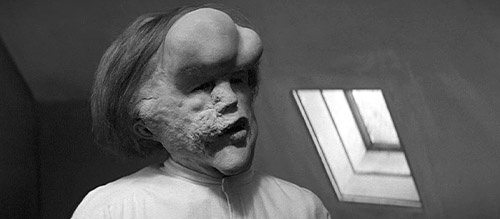The Elephant Man (1980) Review
This article was written exclusively for The Film Magazine by Angel Lloyd.
The Elephant Man (1980)
Director: David Lynch
Screenwriters: Christopher De Vore, Eric Bergen, David Lynch
Starring: John Hurt, Anthony Hopkins, Anne Bancroft
Forty years after its release, David Lynch’s The Elephant Man remains one of the most compassionate and tender films ever made. It seems that, when bringing up the title with anyone, there is the same plaintive awe when reflecting on the film, but there’s also a despondent reluctance to return. Perhaps this is because the cruelty depicted is truly too unbearable to revisit, but even more so it is perhaps unnerving to ponder people’s timeless, perverse fascination with the idea of the ‘freak show’, and all its proceeding forms that still flourish today.
The Elephant Man, based on a true story, depicts the life of John Merrick (John Hurt), a heavily disfigured young man living in the East End slums of Victorian London. It charts his journey from being rescued by Doctor Treeves (Anthony Hopkins) from his enslavement in a side-show carnival to living permanently at the London Hospital, becoming a famed figure of London’s high society. Through this, Lynch’s film persists in confronting the audience with questions of morality; even when John is safe in hospital, is he still being treated as an attraction to feed sordid curiosity, only this time from the upper classes?
The film’s macabre opening sequence is full of nightmarish imagery, depicting the haunting attack on John Merrick’s mother by an angry elephant. It begins with an ominous tinkling circus theme that could be mistaken for a baby’s lullaby and then, gradually, the tone descends further into dark surrealism; detailing close ups of an elephant’s gnarled skin, combined with smoke and shadows that crowd the screen. Knocked to the ground, the young woman’s screams are muted, drowned out by the distorted cries of the elephant and a continuous thundering rattle that sounds like an approaching train.
On first impression, you might think a horror film is in store and in many ways Lynch’s signature fever dream aesthetic adheres to that assumption. His portrayal of Victorian London is gloomy and visceral, a portrait of extreme poverty and the rise of industrialisation. From the freak show’s maze of grotesque voyeurism to the gritty inner workings of a vast factory, it portrays society in a state of moral decay. Cold and unsympathetic, it is far removed from John’s romantic and hopeful view of the world, thus the horror lies in people’s capacity for cruelty and the tragedy that John, a tremendously kind and gentle man, falls victim to merely because he looks different. Lynch’s decision to shoot in black and white was a bold one, as it ensures everyone blends in with one another onscreen, putting an emphasis on shapes and contrast, thus making John stand out even more. The film also remains consistently dream-like, the editing style resembling vignettes, fading in and out as we are given a glimpse into the most significant moments of John’s life. This has the effect of being both unnerving and beautifully intimate; it is truly John’s story.
It’s very difficult to watch films about outsiders being made to feel so isolated, ostracised for their differences rather than celebrated for what they have to offer the world. The infamous scene in the train station remains just as harrowing and heart breaking upon every viewing, as John has to scream for his dignity, “I am not an elephant. I am not an animal. I am a human being. I am a man”. It’s horrendous to have to watch someone experience so much pain at the hands of others, the onlookers in the train station suddenly catching themselves in what they’re doing, the film ensuring that we as an audience are forced to do the same.
Even today we seem to endorse a culture that prioritises the views of bullying tabloids and reality shows that still revel in the exploitation of those that are suffering or those that are in some way less fortunate. In our passivity, do we still allow the freak show’s modern day equivalent to flourish? Forty years later, The Elephant Man maintains its poignant sting; it remains so powerfully moving because it underlines the message that love and compassion are not a luxury or a privilege, but indeed a necessity and in every way, a human right.
21/24
Written by Angel Lloyd
You can support Angel Lloyd in the following places:


